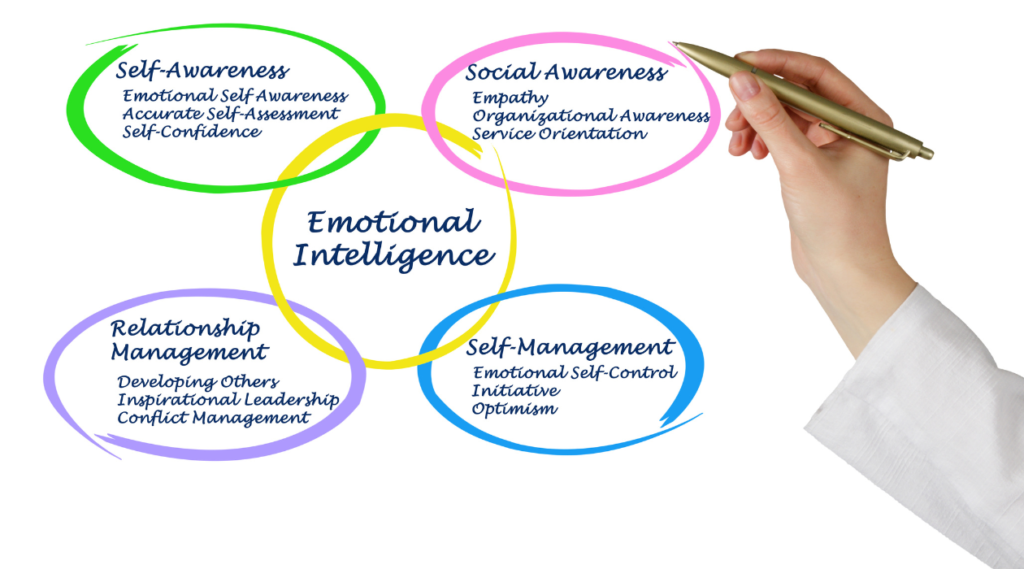Table of Contents
Introduction
Emotional intelligence (EI) is a critical skill that involves understanding and managing one’s own emotions and the emotions of others. For writers, harnessing EI can significantly enhance character development, making characters more relatable, complex, and authentic. In this blog post, we will explore how writers can apply emotional intelligence to create deeper, more compelling characters that resonate with readers.
Understanding Emotional Intelligence in Writing
1. What is Emotional Intelligence?

- Definition: Emotional intelligence refers to the ability to recognize, understand, and manage our own emotions, and to recognize, understand, and influence the emotions of others.
- Components: Key components of EI include self-awareness, self-regulation, motivation, empathy, and social skills.
2. Importance of Emotional Intelligence in Writing
- Character Authenticity: Characters with realistic emotions and reactions are more believable and engaging.
- Conflict and Resolution: Emotional dynamics drive conflict and resolution, essential elements of a compelling narrative.
- Reader Connection: Readers connect deeply with characters whose emotional experiences reflect their own.
3. Common Challenges
- Avoiding Stereotypes: Creating nuanced characters without falling into clichés.
- Balancing Emotions: Ensuring characters’ emotional responses are balanced and appropriate to the context.
Strategies for Integrating Emotional Intelligence into Character Development
1. Develop Self-Awareness in Characters
- Inner Monologue: Use inner monologue to reveal characters’ thoughts and feelings. This provides insight into their emotional landscape.
- Reflection: Show characters reflecting on their actions and emotions, which adds depth and realism.
2. Utilize Empathy
- Multiple Perspectives: Write scenes from different characters’ perspectives to show how each one interprets and reacts to events emotionally.
- Relatable Emotions: Incorporate universal emotions such as fear, joy, sadness, and anger to make characters relatable.
3. Create Complex Emotional Arcs
- Growth and Change: Show how characters grow and change emotionally over the course of the story. This could involve overcoming fears, resolving inner conflicts, or developing new relationships.
- Emotional Highs and Lows: Include emotional highs and lows to create a dynamic and engaging narrative.
4. Balance Action and Emotion
- Show, Don’t Tell: Use actions and dialogue to show emotions rather than just telling the reader what a character feels.
- Physical Reactions: Describe physical reactions to emotions, such as a racing heart, trembling hands, or a clenched jaw, to convey intensity.
5. Build Emotional Conflicts
- Internal Conflict: Develop internal conflicts where characters struggle with their own emotions, such as guilt, shame, or desire.
- Interpersonal Conflict: Create interpersonal conflicts where characters’ emotions clash, driving tension and drama.
How to Enhance Emotional Intelligence in Your Writing

1. Study Real People and Relationships
- Observation: Observe how people express and manage their emotions in real life. Note their body language, tone of voice, and facial expressions.
- Interviews: Conduct interviews or conversations with people from different backgrounds to understand diverse emotional experiences.
2. Read Widely
- Literary Analysis: Analyze how successful authors handle emotional intelligence in their characters. Pay attention to dialogue, inner thoughts, and emotional arcs.
- Genres: Read across different genres to see how emotional intelligence is portrayed in various contexts.
3. Practice Writing Emotional Scenes
- Writing Exercises: Engage in writing exercises that focus on emotional scenes, such as a character experiencing a significant loss or a joyful reunion.
- Feedback: Share your writing with others and seek feedback on how well you’ve conveyed the characters’ emotions.
4. Reflect on Personal Experiences
- Emotional Recall: Draw on your own emotional experiences to add authenticity to your characters’ emotions.
- Journaling: Keep a journal of your emotional experiences and reflect on how you might use them in your writing.
FAQs
-
What is emotional intelligence in writing?
Emotional intelligence in writing involves understanding and portraying characters’ emotions authentically, making them relatable and compelling.
-
How can I create authentic emotional reactions in my characters?
Use inner monologue, physical reactions, and actions to show emotions. Draw on personal experiences and observe real people for inspiration.
-
Why is emotional intelligence important in character development?
It adds depth, realism, and relatability to characters, enhancing the overall narrative and connecting with readers on a deeper level.
-
How can I balance action and emotion in my writing?
Show emotions through actions and dialogue, and ensure physical reactions to emotions are described to convey intensity without overwhelming the narrative.
-
What are some exercises to improve emotional intelligence in writing?
Practice writing emotional scenes, keep a journal of personal experiences, and analyze successful authors’ techniques for handling emotional intelligence.
Conclusion
Emotional intelligence is a powerful tool for writers, enabling the creation of characters that are authentic, relatable, and deeply engaging. By understanding and applying EI principles, writers can enhance their character development, resulting in richer, more compelling narratives. Embrace the art of emotional intelligence in your writing and watch your characters come to life with depth and realism.
Ready to deepen your character development with emotional intelligence? Start by observing real people, practicing writing emotional scenes, and reflecting on personal experiences. Share your experiences and any questions you have in the comments below. Don’t forget to subscribe to our newsletter for more tips on enhancing your writing skills!
Additional Resources
Grokly Course : https://learn.grokly.me/online-courses/emotional-intelligence-for-writers-39061
Enhance your character development with these resources and start writing with emotional intelligence today!

